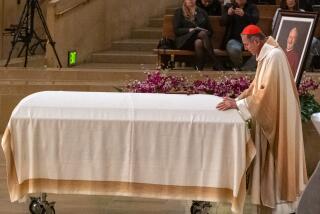O.C. Case Sparks Supreme Court Sanity Ruling
- Share via
In a ruling stemming from an Orange County capital murder case, the U.S. Supreme Court on Monday ruled that states can require defendants to prove they are mentally incompetent to stand trial.
The 7-2 decision upheld the conviction of Death Row inmate Teofilo Medina Jr., who was sentenced to death for three execution-style murders during a 1984 robbery spree in Orange County. His appeal was being closely monitored by prosecutors because it threatened to shift to the state the burden of proving mental competency.
Medina had argued that prosecutors should have had the burden of proving he was mentally competent to stand trial. However, the high court said that the California law placing that responsibility on defendants does not violate their constitutional right to due process.
An attorney for Medina, state Deputy Public Defender Michael Pescetta, said he would file a motion for a rehearing.
Pescetta said the effect of the ruling is “very bad” for defendants such as Medina, where the question of mental competency is not a clear-cut case.
“Because psychiatry is not an exact science, and because in a case like this one, where everyone had a different diagnosis of Mr. Medina, it’s basically unfair . . . to put the burden on him,” Pescetta said.
Justice Anthony Kennedy said for the court majority that while “reasonable minds may differ as to the wisdom of placing the burden of proof on the defendant in these circumstances, the state is not required to adopt one procedure over another on the basis that it may produce results more favorable to the accused.”
Justices Harry Blackmun and John Paul Stevens sharply disagreed, saying the Constitution does not allow a trial for defendants who may be mentally incompetent.
State Deputy Atty. Gen. Holly Wilkens praised the ruling, saying it will make it that more difficult for criminal defendants to claim their right to due process has been violated.
If prosecutors had the burden to prove mental competency, there would be no incentive for defendants to cooperate in finding a diagnosis, Wilkens said.
“If you are facing the gas chamber, there’s no incentive to hurry up and go to trial,” she said.
Also welcoming the decision was Michael Rushford, president of the Sacramento-based Criminal Justice Legal Foundation, which filed a “friend of the court” brief supporting the California law.
“In a sense, the prosecution, nationally, was able to dodge a bullet,” Rushford said, adding that had the court agreed with Medina, defendants would have been allowed to go to court and say: “I am too crazy to go to trial, but it’s up to you to prove it.”
Medina, now 47, has spent most of his adult life in prison for violent crimes. He was on parole from a rape conviction in Arizona when he went on a three-week rampage in 1984 and killed three store clerks in Orange County.
Medina claimed that as a youth he learned he was a “high priest” after a revelation in which he saw Jesus Christ and the Virgin Mary, and that he was driven to kill by voodoo, witchcraft and black magic.
Six medical experts offered varying opinions on Medina’s mental health during a 1986 competency hearing, during which he engaged in verbal and physical outbursts. On one occasion he overturned the counsel table.
His attorneys claimed he was mentally ill and could not remember the murders. But a trial jury ruled he was competent and sane.
More to Read
Sign up for Essential California
The most important California stories and recommendations in your inbox every morning.
You may occasionally receive promotional content from the Los Angeles Times.










